Contents
Page List
Guide

POLITICAL THEOLOGY ON EDGE

TRANSDISCIPLINARY THEOLOGICAL COLLOQUIA
Theology has hovered for two millennia between scriptural metaphor and philosophical thinking; it takes flesh in its symbolic, communal, and ethical practices. With the gift of this history and in the spirit of its unrealized potential, the Transdisciplinary Theological Colloquia intensify movement between and beyond the fields of religion. A multivocal discourse of theology takes place in the interstices, at once self-deconstructive in its pluralism and constructive in its affirmations.
Hosted annually by Drew Universitys Theological School, the colloquia provide a matrix for such conversations, while Fordham University Press serves as the midwife for their publication. Committed to the slow transformation of religio-cultural symbolism, the colloquia continue Drews long history of engaging historical, biblical, and philosophical hermeneutics, practices of social justice, and experiments in theopoetics.
Catherine Keller, Director
POLITICAL THEOLOGY ON EDGE
Ruptures of Justice and Belief in the Anthropocene
CLAYTON CROCKETT AND CATHERINE KELLER, EDITORS
FORDHAM UNIVERSITY PRESS  NEW YORK
NEW YORK  2022
2022
Copyright 2022 Fordham University Press
All rights reserved. No part of this publication may be reproduced, stored in a retrieval system, or transmitted in any form or by any meanselectronic, mechanical, photocopy, recording, or any otherexcept for brief quotations in printed reviews, without the prior permission of the publisher.
Fordham University Press has no responsibility for the persistence or accuracy of URLs for external or third-party Internet websites referred to in this publication and does not guarantee that any content on such websites is, or will remain, accurate or appropriate.
Fordham University Press also publishes its books in a variety of electronic formats. Some content that appears in print may not be available in electronic books.
Visit us online at www.fordhampress.com.
Library of Congress Cataloging-in-Publication Data available online at https://catalog.loc.gov.
Printed in the United States of America
24 23 22 5 4 3 2 1
First edition
CONTENTS
| Catherine Keller and Clayton Crockett
| William E. Connolly
| Michael Northcott
| Austin Roberts
| Gil Anidjar
| Winfield Goodwin
| Lawrence E. Hillis
| Kelly Brown Douglas
| Larry L. Welborn
| Lisa Gasson-Gardner
| Balbinder Singh Bhogal
| Mehmet Karabela
| Seth Gaiters
| Nolle Vahanian
| J. Kameron Carter
POLITICAL THEOLOGY ON EDGE

Introduction: Political Theology on Edge
CATHERINE KELLER AND CLAYTON CROCKETT
I
What is political theology? The modern conversation around the notion of political theology revolves all too famously around the book by that name by Carl Schmitt. It focuses on the concept of sovereignty, who in personalist terms is the one who decides on the exception. He traces this idea of sovereignty from a Christian theological conception of God, developed in the European Middle Ages, as the ultimate source of power and authority. For Schmitt, sovereign power, even if it appears divided, is a unifying force to decide what constitutes an exception to the normal situation. How do we decide who is excluded from our religion, community, nation, race, species, or planet? And how is that decision to be policed and enforced? Authority retains a link with divinity, however implicit. As with sovereignty, political theology finds that most of our modern political concepts have roots in theology, which means that our secular world remains deeply theological in its workings.
Over the last few decades we have witnessed around the globe the resurgence of political, literalist, and fundamentalist forms of religion in a way that challenges the modern secularist hypothesis that predicted religions demise. In addition to the repudiation of secularism, we are seeing signs around the world of the collapse of the modern liberal European order, including the American empire that succeeded it. This is what Schmitt calls the International Law of the Jus Publicum Europaeum in The Nomos of the Earth, and it applies not just to Europe but to our inheritance of European traditions of liberalism and market capitalism. And at our moment of this saeculum, we face not just political but also ecological crises, as we confront the sharpening edges of global warming framing the new geological order some call the Anthropocene.
If our shared political and ecological crisis counts at the same time as a theological crisis, a crisis in and of theology, it is because theology inhabits all of our politics in eschatological terms. If eschatology signifies the teaching of end things, what now appears as the end of all of our efforts and actions? What is happening in light of this end, to bring about, to redirect, or to postpone this eschaton? During the twenty-first century, Drew University has been the site of annual Transdisciplinary Theological Colloquia that have engaged with the most current and cutting-edge issues confronting our world, its meaning and its telos, in theological, political, and ecological terms. Political Theology is no exception. But how we think about political theology must and does change in light of the urgent challenges of our time, including anthropogenic climate change, global religious conflicts, the ongoing fires of racial injustice and the Black Lives Matter movement, not to mention the global pandemic in the form of COVID-19.
Along these edgy threats of various ends appear no easy answers. There is no theoretical trick/action/practice, no spiritual somersault, no miraculous brinksmanship that will rescue us from the political precipice of this time. What is this time? Ill-coordinated with schedules of publication or journalistic timeliness, the moment of this volume takes place at the time of multiple intersecting crises. These collective and collecting crises do not reveal the End of Time. They do howeverfrom the point of view of the present conversationmark a civilizational brink: There is nothing that has predetermined that we must go over it. Nor do we (the authors) guarantee that if you (the readers) will only put our theory into practice, we (the species) wont go down. This tense presentirreducible to any future-trumping US regime, indeed to any exceptionalist powerfinds itself at multiple, shifting edges.
The intersecting politics of race and immigration, of gender and sexuality, of democracy and economics, of movements and partiesindeed of the religious and the secularseem to converge along the eerie edges of the Anthropocene. Here the human and the nonhuman reveal (apocalyptein) their planetary relation as unsustainable. The End after all? Or rather a strange mingling of ends? One million species currently on the brink of extinction, not to mention the unthinkable millions of humans whose doom will be sealed by unmitigated global warming, might lead us to join Christian fundamentalism in collapsing revelation into termination. But we recall that eschatology, mistranslated as a simple doctrine of The End, means actually teaching on the

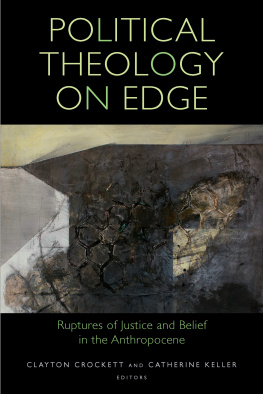

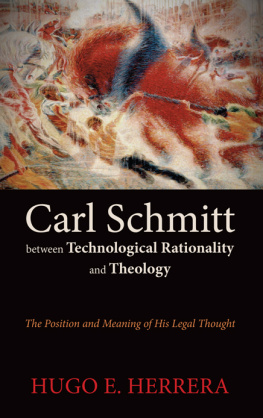
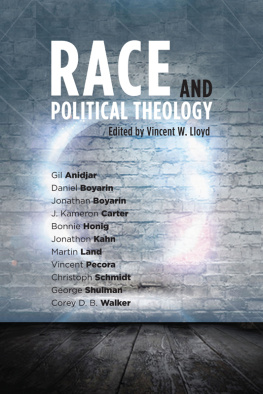
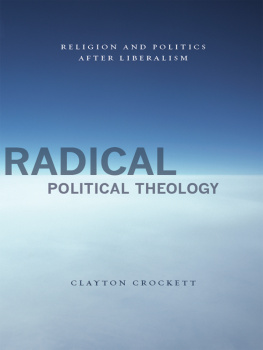
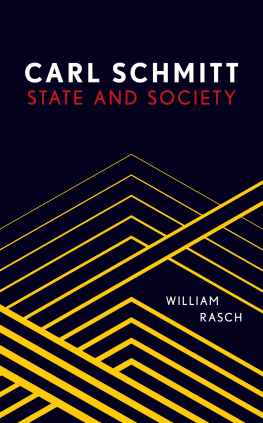
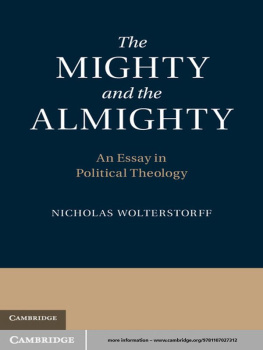
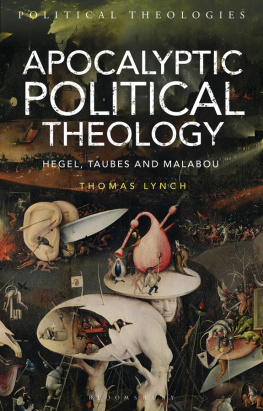
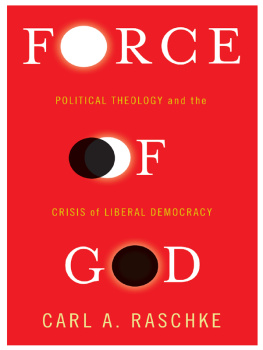


 NEW YORK
NEW YORK  Introduction: Political Theology on Edge
Introduction: Political Theology on Edge